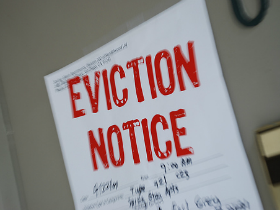What's Hot: Did January Mark The Bottom For The DC-Area Housing Market? | The Roller Coaster Development Scene In Tenleytown and AU Park
 How to Evict a Problem Tenant
How to Evict a Problem Tenant
✉️ Want to forward this article? Click here.

Seeking out tenants with high credit scores and glowing reviews from previous landlords is ideal, but every so often a landlord encounters a problem tenant who makes their life difficult. Whether they are delinquent on their rent, trashing the home or running a drug den, an eviction occasionally becomes necessary.
We put together a quick guide to evicting a problem tenant in the District with help from the Washington, DC Tenant Survival Guide and Rick Gersten from Urban Igloo. Rules vary by jurisdiction and these are specific to DC, which is known for it’s particularly tenant-friendly laws. Of course, it will be helpful for both parties to have legal counsel in these situations, but UrbanTurf thought that this could be a start.
- Be as specific as possible when drawing up the lease. Gersten also recommends doing a thorough inspection of the home with the tenant before he/she moves in, affirming that the condition of the house, the appliances and the systems is good. Take a photo with a newspaper, with the date visible, to verify the date that the inspection happened.
- Make sure your paperwork — the Certificate of Occupancy and Basic Business License, for example — is in order for the rental unit, and that the unit meets all housing code requirements.
- Prepare an initial notice to vacate. The notice should include the basis for the eviction and provide the tenant a description of how to fix the problem.
- For violations including nonpayment of rent, violation of the lease or committing an illegal act in the home, you must give your tenant 30 days notice. If you simply don’t get along with the tenant, but they are paying rent and abiding by the rules of the lease, it will be extremely difficult to evict them. (For reasons that come from the landlord, like selling the home or undertaking major renovations, the tenant has a larger window of time. The rules are outlined well in the guide.) If your tenant has turned your home into a “drug haven,” you’ll be able to move faster.
- If the tenant does not leave, you can start the official eviction process. File a suit of possession at the Landlord and Tenant Branch of the Court. Bring a copy of the notice to vacate. You are usually given a court date within three or four weeks (“Drug haven” cases will get an earlier court date.)
- Deliver your notice of eviction in person, or post it on the door. Your tenant should have clear knowledge of the court date.
- Meet your tenant in court.
- If your tenant loses the case, file a “writ of eviction,” which will officially authorize the eviction. The writ, via the U.S. Marshal Service, will arrive at the address by mail. The cost for filing is $100. If the tenant owes you money, you can also file a money judgement.
- With the writ of eviction, you have permission to take possession of the unit. A Deputy U.S. Marshal will be present. In DC, evictions cannot be scheduled on rainy days, or days when the temperature will drop below 32 degree Fahrenheit.
- The landlord is responsible for bringing any equipment or hiring service-people to help. For example, landlords may want to rent a truck or hire a locksmith. The U.S. Marshals suggest hiring an eviction crew and bringing ample plastic bags and boxes.
Have any readers ever dealt with a problem tenant? Tell us about your experience in the comments.
This article originally published at http://dc.urbanturf.production.logicbrush.com/articles/blog/how_to_evict_a_problem_tenant/5663.
Most Popular... This Week • Last 30 Days • Ever

As mortgage rates have more than doubled from their historic lows over the last coupl... read »

The small handful of projects in the pipeline are either moving full steam ahead, get... read »

Lincoln-Westmoreland Housing is moving forward with plans to replace an aging Shaw af... read »

The longtime political strategist and pollster who has advised everyone from Presiden... read »

A report out today finds early signs that the spring could be a busy market.... read »
DC Real Estate Guides
Short guides to navigating the DC-area real estate market
We've collected all our helpful guides for buying, selling and renting in and around Washington, DC in one place. Start browsing below!
First-Timer Primers
Intro guides for first-time home buyers
Unique Spaces
Awesome and unusual real estate from across the DC Metro













